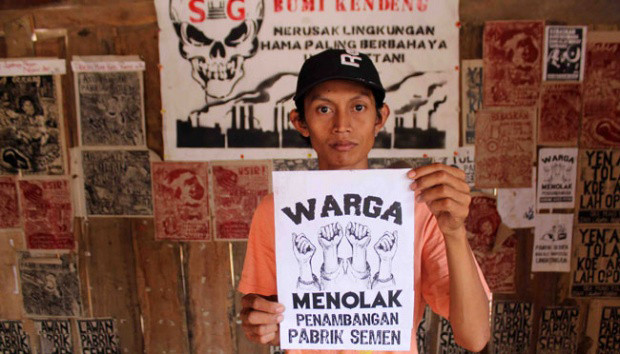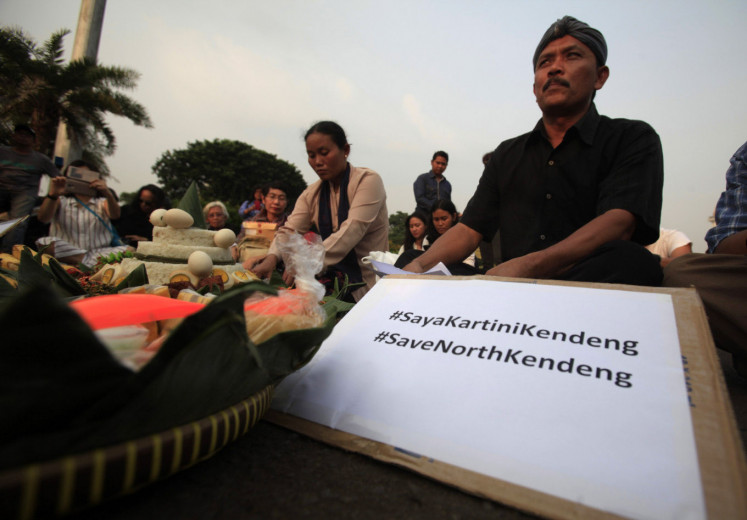Popular Reads
Top Results
Can't find what you're looking for?
View all search resultsPopular Reads
Top Results
Can't find what you're looking for?
View all search results'This is Kendeng. It gives us all life': Farmer shows off succulent chili to defend land
“Since our grandparents were farmers, [the land] has been enough for us,” Gunretno, who cultivates about 9,000 square meters of farmland, said.
Change text size
Gift Premium Articles
to Anyone
A
farmer pushing back against cement factories carrying out activities on the Kendeng Karst Mountains in Central Java has shown off his succulent chili to defy the perception that Kendeng is an arid place and needs factories to provide welfare to locals.
Joko Prianto, a farmer in Rembang, shared pictures of his chili plants to his friends and later, one of them, Dandhy Laksono shared the pictures on his Twitter account, gaining more than 15,000 retweets and more than 21,000 likes as of Feb. 25.
Joko Prianto, petani Rembang yang menolak PT Semen Indonesia dan dikriminalisasi, hari ini memamerkan tanaman cabainya (organik).
Ada dua hal yang ia bantah: (1)Tidak benar pegunungan Kendeng itu tandus (layak ditambang). (2) Tidak benar ia butuh investor dan lapangan kerja. pic.twitter.com/qrpaH9r2vb
— Dandhy Laksono (@Dandhy_Laksono) February 19, 2020
“Some people say Kendeng is arid. In fact, during the dry season, some land looks dry but we have been farming here for generations and the land is sufficient,” Joko told The Jakarta Post recently.
Joko Prianto in 2015. (Tempo/Budi Purwanto)“This is Kendeng. It gives us all a life,” he said.
Joko, along with hundreds of farmers in the Kendeng Karst Mountains, have fought against cement factories for about seven years. They insist that farming has given them enough wealth and they do not need industrial jobs. In the Kendeng area in Rembang, there is a natural aquifer called Watu Putih, and they want the aquifer to be protected.
Read also: Hundreds of Rembang people march 150 kilometers to protest cement factory
Gunretno, who lives in Pati, in a community called Sedulur Sikep, said he and his neighbors, about 200 other families, supported themselves through farming, which was enough. Along with his sister, Gunarti, Gunretno has pioneered the movement to reject factories and defend the environment. In 2018, Sedulur Sikep received the prestigious Yap Thiam Thien human rights award.
Gunretno, coordinator of the Kendeng Mountain Community Network (JMPPK), along with farmers from the Kendeng Mountains, stage a protest in front of the State Palace in Jakarta in 2016. (JP/Dhoni Setiawan)“The Karst area in Pati is a water sponge. This is a place where water lives and it is for farming and tourism,” he told the Post. “I have done organic farming for 20 years. I plant vegetables, rice, chili, tomatoes and squash.” He said the bounty from nature was enough and that they had extra that could be sold.
“Since our grandparents were farmers, [the land] has been enough for us,” Gunretno, who cultivates about 9,000 square meters of farmland, said.
Joko said he expected to have the first harvest of his thousands of new chili plants in about 30 days. Planted on 2,500 sq m, he hoped to have 500 to 700 kilograms sold at Rp 45,000 per kg.
He recently adopted organic farming methods and said he could save a lot of money from replacing chemical fertilizer with cattle urine that he got for free from his neighbors. “Plenty of cattle urine here,” he said. He plans to phase out chemical fertilizer and pesticides completely next year. “Why the shift to organic? Well, we have to love our earth that feeds us,” he said.
Read also: Kendeng farmers demand govt take action
Despite the wealth they harvest through farming, however, the farmers have yet to live in peace. Threats of industrialization loom large, especially in Rembang, where mining activities for a cement factory are ongoing. “I can hear the mining sounds at night,” Joko said.
In Pati there has been no activity but Gunretno said he would not stop fighting until the government changed the status of the Kendeng Karst Mountains to that of a protected area because water in the mountain area was essential for their livelihood as farmers.
For Joko and Gunretno, protecting the Kendeng Karst Mountains is not just for their sake. “Kendeng is not just ours but it belongs to the world”.












